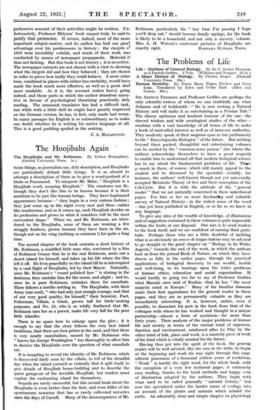The Fugitive Bolsheviks
THE political emigre who joins hands with a foreign country in order to alter conditions in his own inevitably incurs among his fellow-countrymen a hatred far more bitter than that bestowed on the foreigner, who is regarded as a natural enemy. As at the same time his activities are usually of an obscure and subterraneous nature, it is extraordinarily difficult to get a just appreciation of them. His new allies preserve a discreet silence ; his enemies produce lurid " reve- lations," but from lack of reliable information, accuracy is usually sacrificed to sensationalism. This is a pity, since the part played by such emigrés, particularly in Central Europe, is an interesting and often a very important one, especially at the present time, when the great political changes and violent social upheavals which followed the World War have produced an unparalleled number of political refugees.
Professor Malyusz, of Szeged University, has undertaken the difficult task of describing the activities of the Socialist and Communist refugees who fled from Hungary in 1919. They had ruled that country for about eight months—some of the most difficult and unhappy months which Hungary has ever known—before being expelled by the Roumanian Army and the representatives of the previous social order who, the writer should in fairness have pointed out, - had themselces been " fugitives " in a foreign land and were indebted in no small degree to foreign help for their restoration. The " fugitive Bolsheviks," under which comprehensive title the writer includes a very mixed band of Bolsheviks, Social Democrats and Liberals, took refuge, some in Vienna, which sympathized very warmly with the movement of the Left in Hungary : some in Czechoslovakia or Yugoslavia, which hoped, by exploiting the social question in Hungary, to enlarge still further their frontiers at her expense : some in Russia, at that time still confident of effecting a world revo- lution. There followed a confused and sensational period during which first one, then another of these allies seemed to hold out hope of restoring the emigres to Hungary, and they took part in many adventures : Communist conspiracies, a commercial boycott of Hungary, the establishment, under Yugoslav protection, of an independent republic in the- dis- trict of Baranya, in Southern Hungary. These are little- known chapters of modern history which were well worth recording, and make the dark story an interesting one enough at times. One hope after another, however, proved fruitless. The new regime in Hungary gave evidence of its stability ; her neighbours grew tired of adventure, and the emigres to-day have lost most of their importance.
It is possibly true that the time has now come when a com- prehensive account of their activities might be written. Un- fortunately, Professor Malynsz' book cannot truly be said to justify that pretension. It covers, indeed, most of the more important subject-matter, and its author has had one great advantage over his predecessors in history : the emigres of 1919 were incredibly voluble, and much of their work was conducted by means of newspaper propaganda. Material is thus not lacking. But this book is not history ; it is invective. The newspaper extracts are not chosen with a view to showing what the emigres did and how they behaved ; they are chosen in order to prove how badly they could behave. A more sober tone, combined in places with rather less credulity, would have made the book much more effective, as well as a great deal more readable. As it is, the account makes heavy going indeed, and those parts in which the author abandons narra- tive in favour of psychological theorizing practically defy reading. The unnamed translator has had a difficult task, but while with a little skill he might have greatly improved on the German version, he has, in fact, only made bad worse. In many passages his English is so extraordinary as to make one doubt whether he is writing his native language at all. This is a good pudding spoiled in the making.
C. A. MACARTNEY.































 Previous page
Previous page